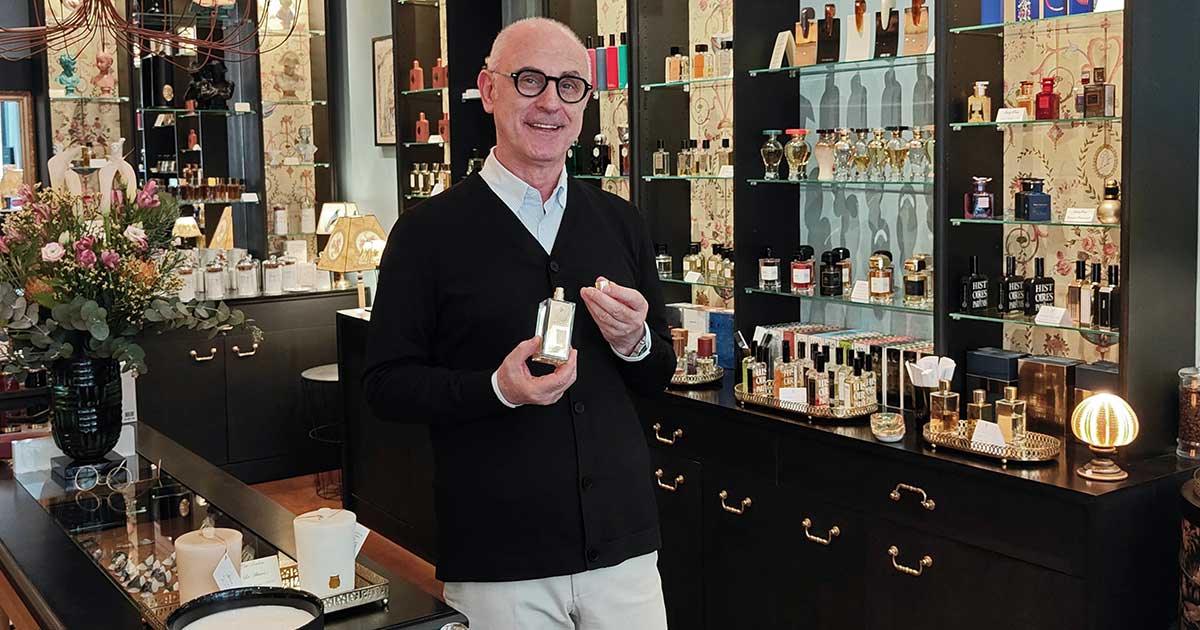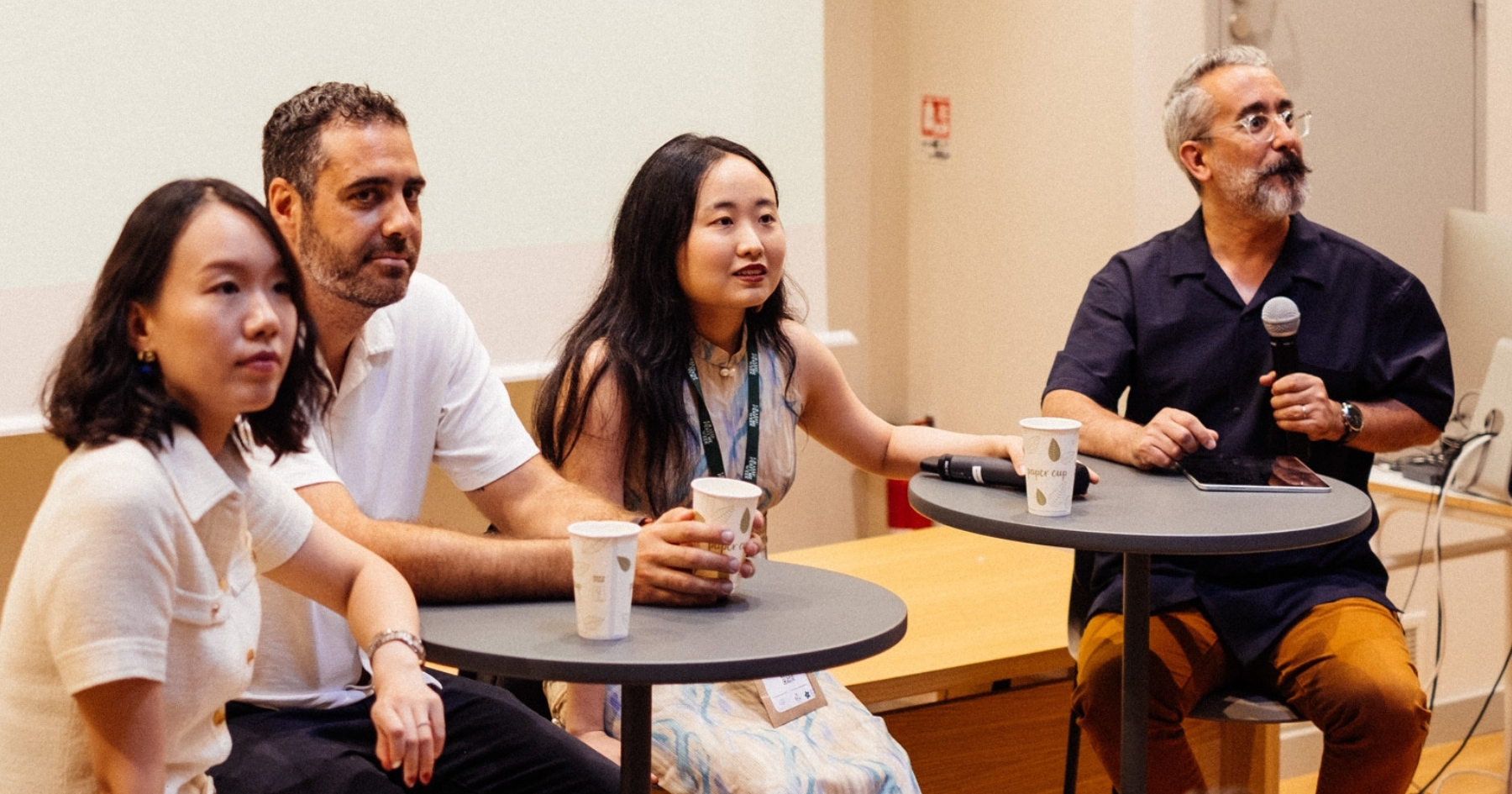Cette publication est également disponible en :
Français
Although Le Paravent founder Serge Laugier originally saw the shop as a high-end decoration outlet, it has become a benchmark for niche perfumery in Lyon. Located in the city centre art gallery district, the shop is fully committed to an artistic and independent vision of olfactory creation. Interview.
What led you to offer perfumes in your shop?
Le Paravent was founded in 2011, in a chic, artistic area of Lyon. I created a sophisticated ambiance with a range of products related to the art of living in general. I trained as an oenologist when I was really young, so perfumes and scents have always played a big part in my life! When the shop first opened I proposed scented candles from Cire Trudon, the oldest French wax manufacturer still in business, which have rich and complex fragrances. Customers who came in often said they’d like to see a range of exceptional perfumes: it quickly became clear that it was the right direction to take. And I naturally turned to the loveliest independent perfume brands, which were an immediate and lasting hit!
How did you build your selection of brands?
It’s important to me to offer the more niche fragrances, because they always have a unique olfactory signature: so I sell lots of independent brands that aren’t available elsewhere in Lyon. The first I chose, back in 2015, was Le Galion, an iconic French fragrance house. I’d met its founder, Nicolas Chabot, at the Esxence fair in Milan, and fell in love with its extraordinary creations. Then, happily, the very eminent Lubin perfume house joined us. But we also select brands with an avant-garde approach, which target a customer base that can be a little younger. One example is Olfactive Studio, set up by Céline Verleure, whose idea of combining perfumery and photography is genuinely innovative. Another is Histoire de parfums, which was founded by the fascinating Gérald Ghislain and has a very carefully constructed identity. There are also the Naomi Goodsir fragrances, representing authentically independent perfumery with compositions that draw on such wonderful sources of inspiration!
I take the time to subject each perfume to an olfactory assessment by wearing them and talking about them with our regular customers. When you get attached to a brand, you can draw attention to it and thus help it develop. I also focus on partnerships, the ties you establish with creators and their teams. I only work with people who are passionate about what they do, and no doubt that makes a difference. You also have to make sure that each perfume has something unique about it: if I get two concepts that are too similar from two different brands, I have to reject them to avoid any duplication.
How do you discover new brands?
I particularly enjoy looking for new brands: sometimes I go travelling for days at a time and immerse myself in new worlds. My customers also tell me about their discoveries, which is very instructive! Trade fairs like Esxence and Pitti Fragranze have made it possible to meet remarkable perfume houses. Certain brands get in touch with me directly and sometimes the chemistry is there! For instance, when Victorien Sirot relaunched Maison Violet, he called me to tell me all about the project, which was marvellous, a fascinating adventure that captivated me. I ordered their first collection, Héritage, which was an immediate hit. Finding a new brand isn’t difficult; managing it properly and raising its profile takes more work. The range of brands is growing, but when you meet a house you like, you commit to it totally. One example is Marc Antoine Barrois, whose perfumes are hugely successful in the shop!
What do you do when certain products are less successful?
We sometimes see lower demand for compositions from the more traditional perfume world. Bold fragrances, on the other hand, meet the needs of a very specific customer base, particularly younger perfume lovers. And when a perfume is less successful, I don’t question the brand but prefer organising a meeting with the teams to look at what’s happening. A little training to teach me to talk more expertly about it and update my knowledge often works well. Which is why it is important to have a good relationship with our partners. The overall presentation of the fragrances is also very important. The shop, set-up and welcome must all be well-designed and professional. Then the price is no longer necessarily an obstacle, since when customers buy a bottle they are treating themselves to a high-value gift.
Do you encounter resistance from people who enter the shop and are accustomed to more traditional creations?
Our visitors are sometimes looking for a fragrance that’s like the one they’re used to wearing. Instead, I take them on a journey of olfactory discovery by comparing the different perfume families (woody, flowers, ambery, etc.) and finding out what their desires and emotions are. With these customers, it’s a real educational process to get them to agree to gradually relinquish their habits. Together we rediscover ingredients worked in different ways. All very gently. It’s vital to take your time: the discussion is so absorbing and can easily last an hour. Fragrances stir up deep-seated emotions: some people can be moved to tears when they find “their” perfume! It’s so gratifying to be able to give them that experience! And then there are certain fragrances that lie outside our comfort zones, like Nuit de bakélite by Naomi Goodsir, which took over four years to develop. The first step is not always easy for customers who aren’t familiar with these sorts of highly designed styles; but it also opens the door to seeing perfume in a different way, as a true artistic creation.
- More about Le Paravent : le-paravent.fr/
REPORT « NICHE AND CONFIDENCES »
- Niche perfumery moves centre stage, by Jessica Mignot
- Sylviane Lust (Beauty by Kroonen) : “We choose complex fragrances that evolve on the skin, and that tell you the perfumer has been given a free hand.”, by Jessica Mignot
- Karine Torrent (Floratropia) : “In my view, 100% natural perfumery is the new niche”, by Jessica Mignot
- Barbara Herman (Eris Parfums): “Whether consciously or not, with each new creation I tend to explore a very different path from the previous one”, by Sarah Bouasse
- Serge Laugier (Le Paravent): “It’s important to me to offer the more niche fragrances, because they always have an unique olfactory signature”, by Jessica Mignot
- Cécile Zarokian: “It’s possible to compete successfully with the big fragrance houses”, by Guillaume Tesson
- Pissara Umavijani (Dusita): “The hardest thing for a perfumer is expressing your signature style in different registers”, by Sarah Bouasse
- Clara Feder and Michel Gutsatz (Le Jardin retrouvé): “We’re trying to build a balanced collection while sticking to our motto: avant-garde as a legacy.”, by Jessica Mignot
- Liam Sardea (LKNU): “We try to guide each person to create their own constellation in this vast cosmos”, by Guillaume Tesson
- Dhaher bin Dhaher (Tola): “I’m spending more and more of my time breaking down barriers between olfactory cultures”, by Guillaume Tesson
- Nathalie Feisthauer (LAB Scent): “For me, niche is a definition of beauty”, by Guillaume Tesson
- Franco Wright (Luckyscent): “Ultimately customers see how the niche category pushes fragrance in more interesting directions”, by Anne-Sophie Hojlo
- Luca Maffei (Atelier Fragranze Milano): “Niche perfumery allows me to take risks”, by Jessica Mignot
- Murat Katran and Mert Guzel (Nishane): “Istanbul is literally a bridge between cultures”, by Guillaume Tesson
- Agnieszka Lukasik (Galilu): “Now, the brands come to us”, by Anne-Sophie Hojlo








Comments